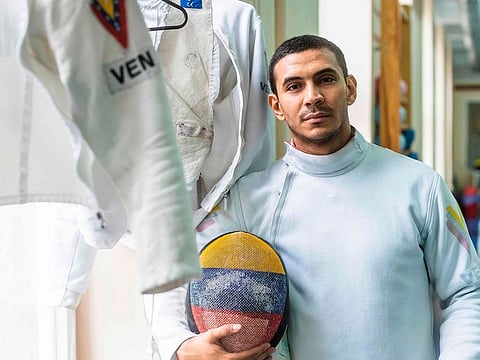Olympic champion turns delivery rider to make ends meet
London Olympics foil gold medallist will go for glory again at the Tokyo Olympics

Lodz, Poland: With a large delivery bag on his back Venezuelan Olympic champion fencer Ruben Limardo is out cycling around his adopted hometown in Poland, making ends meet in a strange but heartwarming tale from this time of pandemic.
The 35-year-old London Olympics foil gold medallist will go for glory again at the Tokyo Olympics next year, but stunned his fans last week when he made a tweet revealing the nature of his new job.
"You have to earn your way and this is a job like any other," he told AFP as he went about a typical day of training and making food deliveries for Uber Eats.
And he is not the only one - 20 other members of Venezuela's national fencing team live the same improbable existence in the town of Lodz in Poland.
"We are all delivery riders," said Limardo, speaking in fluent Polish.
He won his Olympic title eight years ago - the first fencer from Latin America to do so since Cuba's Ramon Fonst in 1904.
He also became only the second Venezuelan gold medallist, 44 years after boxer Francisco Rodriguez.
'Pandemic turned everything around'
Five mornings a week, the young Venezuelan fencers gather in a former workshop on a largely abandoned industrial site in Lodz to cross swords.
Their white uniforms clash with the yellow, blue and red of their national flag which dominate the decor.
At the entrance, a pile of bikes and green cool-bags await the stroke of 1:00pm when each of the fencers finish their training, has a quick shower and then sets off for deliveries in the chill of a Polish autumn.
"We get very little money from Venezuela because of the crisis there. And the pandemic has turned everything around. There are no competitions, the Tokyo Olympics were delayed for a year and the sponsors are saying they will start paying again in the new year.
"That's why we have to make money on the road," said Limardo, who does around 50 kilometres (31 miles) per day on his bike, earning around 100 euros a week.
"It works well with our training. We could even say it is an extension of the training," said the married father of two.
"It allows us to live, finish our studies. We help each other out with training, paying rents. Everyone works to finance the others in the group," he said.
'The dream is still there'
Ruben Limardo has lived in Poland for 19 years.
He was encouraged to move there by an uncle who wanted to create a centre for Venezuelan fencers in this economically thriving country with relatively low overheads compared to western Europe.
Since moving to Poland, he has created a foundation for Venezuelan fencers as well as a club for taking part in local tournaments and a fencing school for children.
The pandemic has created difficulties but the school is continuing to operate, with the Venezuelan fencers taking it in turns to give lessons.
"But above all we are training to resume competition at any moment. The dream is still there," Limardo said.
"Every time I make a delivery I tell myself that it will help me win the medal I want at Tokyo in 2021."
Sign up for the Daily Briefing
Get the latest news and updates straight to your inbox







